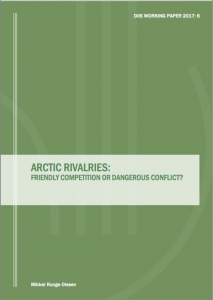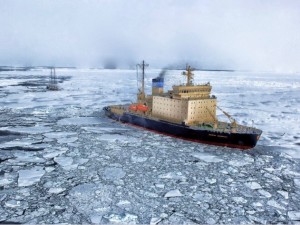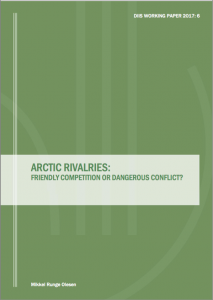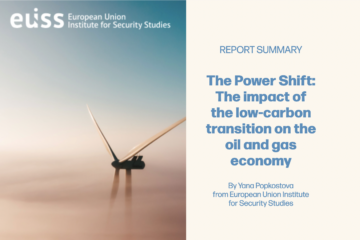Arctic Rivalries: Friendly Competition or Dangerous Conflict?
[:en]by Mikkel Runge Olesen (DIIS)
A recent working paper by Mikkel Runge Olesen, a researcher at the Danish Institute for International Studies, explores the relations between Arctic members as well as the potential for either cooperation or conflict. This paper emphasizes that climate change is impacting and potentially hurrying the talk about issues in the Arctic. The region gained importance during the WWII and Cold War, mainly as water routes for trade and transportation, but has also recently raised the question of sovereignty and resource extraction.
The paper analyzes the different implications and motivations for Arctic actors to deal with each other, but also argues that most of the main security issues are actually spill-over effects from conflicts outside of the region. Thus, the most important issues to look at are those of sovereignty and possible rush for Arctic resources. The paper puts emphasis on the Arctic Five, states with a coastline in the Arctic Ocean: Canada, the US, Denmark, Norway, and Russia.
Out of the Arctic members, Russia is the only one that poses a military threat, however this threat is against the West and mostly the US rather than against Arctic states. Similarly, Russia is the most economically vulnerable member since it heavily depends on its oil and gas extractions, for which it requires Western investments. Since the Ukraine-Crimea crisis, the West has imposed economic sanctions on Russia, slowing down investments on those sectors in Russia.
Another dilemma the paper presents, is the continued attempt by outside actors to have a say in the region´s whereabouts. Furthermore, Russia is the only non-NATO member in the Arctic group, which poses the split decision of Arctic members to ally either with the US or with Russia. Out of all the Arctic, NATO members Norway is the one with the most interest in bringing NATO into the Arctic since it shares sea and land borders with Russia.
Finally, the paper distinguishes the two most important grounds for cooperation among the Arctic members, which are:
- Resistance against attempts by outsiders’ interference with their division of the Arctic, and
- Prospects of extraction of valuable resources, since the extraction of resources from uncontested areas require political stability to attract extractive industries.
Thus, the paper concludes by stating that there is little or no foreseeable conflict in the near future. Rather, there is a lot more incentive to cooperate and compete among the Arctic states.
Read more here:
 [:da]by Mikkel Runge Olesen (DIIS)
[:da]by Mikkel Runge Olesen (DIIS)
A recent working paper by Mikkel Runge Olesen, a researcher at the Danish Institute for International Studies, explores the relations between Arctic members as well as the potential for either cooperation or conflict. This paper emphasizes that climate change is impacting and potentially hurrying the talk about issues in the Arctic. The region gained importance during the WWII and Cold War, mainly as water routes for trade and transportation, but has also recently raised the question of sovereignty and resource extraction.
The paper analyzes the different implications and motivations for Arctic actors to deal with each other, but also argues that most of the main security issues are actually spill-over effects from conflicts outside of the region. Thus, the most important issues to look at are those of sovereignty and possible rush for Arctic resources. The paper puts emphasis on the Arctic Five, states with a coastline in the Arctic Ocean: Canada, the US, Denmark, Norway, and Russia.
Out of the Arctic members, Russia is the only one that poses a military threat, however this threat is against the West and mostly the US rather than against Arctic states. Similarly, Russia is the most economically vulnerable member since it heavily depends on its oil and gas extractions, for which it requires Western investments. Since the Ukraine-Crimea crisis, the West has imposed economic sanctions on Russia, slowing down investments on those sectors in Russia.
Another dilemma the paper presents, is the continued attempt by outside actors to have a say in the region´s whereabouts. Furthermore, Russia is the only non-NATO member in the Arctic group, which poses the split decision of Arctic members to ally either with the US or with Russia. Out of all the Arctic, NATO members Norway is the one with the most interest in bringing NATO into the Arctic since it shares sea and land borders with Russia.
Finally, the paper distinguishes the two most important grounds for cooperation among the Arctic members, which are:
- Resistance against attempts by outsiders’ interference with their division of the Arctic, and
- Prospects of extraction of valuable resources, since the extraction of resources from uncontested areas require political stability to attract extractive industries.
Thus, the paper concludes by stating that there is little or no foreseeable conflict in the near future. Rather, there is a lot more incentive to cooperate and compete among the Arctic states.
Read more here:




